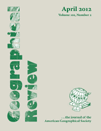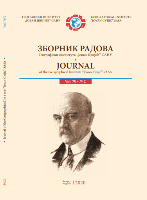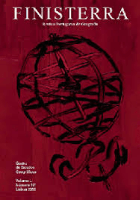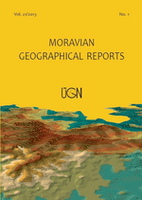
Geographia Cassoviensis
Scope & Guideline
Pioneering Research for a Sustainable Planet
Introduction
Aims and Scopes
- Territorial and Spatial Analysis:
The journal emphasizes the examination of spatial patterns and territorial dynamics, utilizing quantitative and qualitative methodologies to analyze various geographical phenomena. - Environmental Geography:
Research related to environmental changes, including assessments of natural resources, land use dynamics, and ecological impacts, is a significant focus. - Socioeconomic Factors in Geography:
Exploration of the interplay between geographical factors and socioeconomic variables, such as migration, urbanization, and social progress, is a critical aspect of the journal's contributions. - Technological Advances in Geography:
The journal incorporates studies on geospatial technologies, such as GIS and 3D geovisualization, indicating a commitment to modern methodologies in geographical research. - Cultural and Historical Geography:
Investigation into cultural landscapes and historical contexts, particularly in relation to heritage conservation and regional identity, is also a prominent theme.
Trending and Emerging
- Impact of COVID-19 on Geography:
The journal has increasingly published studies addressing the effects of the COVID-19 pandemic on various geographical aspects, such as public transport and tourism, revealing the relevance of timely issues in geographical research. - Integration of Technology in Geographic Research:
There is a growing trend towards the use of advanced geospatial technologies and methodologies, such as UAV imagery and 3D geovisualization, indicating a push for innovation in data collection and analysis. - Focus on Social Inequality and Progress:
Research examining social progress indices, health care disparities, and migration dynamics reflects a heightened awareness of social issues and an emphasis on equity within geographical studies. - Environmental Sustainability and Climate Change:
Emerging themes related to environmental assessments, such as flood simulations and climate impacts on biodiversity, demonstrate an increasing concern for sustainability and ecological resilience.
Declining or Waning
- Traditional Land Use Studies:
While land use and land cover change studies remain relevant, there has been a noticeable shift towards more integrated and technological approaches, leading to fewer publications focusing solely on traditional land use. - Static Historical Analysis:
Research that solely emphasizes static historical contexts without integrating contemporary dynamics or implications appears to be decreasing, as scholars seek more dynamic and interconnected narratives. - Homogeneous Case Studies:
There is a diminishing focus on singular case studies that do not incorporate comparative or broader contextual analyses, as the journal moves towards more comprehensive and multifaceted research approaches.
Similar Journals

GEOGRAPHICAL REVIEW
Transforming Perspectives on Spatial and Environmental ChallengesGEOGRAPHICAL REVIEW, published by Taylor & Francis Inc, is a premier academic journal recognized for its influential contributions to the fields of geography and earth-surface processes. With an ISSN of 0016-7428 and an E-ISSN of 1931-0846, this journal has established itself as a vital resource for researchers, professionals, and students alike. The journal maintains a strong reputation with a Q1 ranking in both Earth-Surface Processes and Geography, Planning and Development, reflecting its scholarly impact and relevance in the academic community. Additionally, it holds a notable position in Scopus rankings, placing #181 out of 821 in Social Sciences and #45 out of 179 in Earth and Planetary Sciences. Although it is not open access, the GEOGRAPHICAL REVIEW remains essential for those seeking to expand their understanding of spatial analysis and environmental processes from its historical inception in 1969 to its ongoing publications through 2024. Explore rigorous research articles, critical reviews, and innovative studies that shape the discourse in geography and earth sciences today.

Boletin Goiano de Geografia
Empowering Research through Open Access KnowledgeBoletin Goiano de Geografia is a distinguished academic journal dedicated to the field of Geography, published by the Universidade Federal de Goiás, Instituto de Estudos Socio-Ambientais. Since its inception in 1981, this Open Access journal has provided invaluable insights into the geographical dynamics of Brazil and beyond, promoting scholarly research and dialogue among geographers, environmentalists, and social scientists. The journal seeks to advance knowledge through the dissemination of research articles, reviews, and case studies that address contemporary issues in human and physical geography. With a commitment to fostering interdisciplinary collaboration, Boletin Goiano de Geografia serves as a vital resource for researchers, professionals, and students seeking to explore the complex interactions between society and the environment. Situated in the vibrant academic landscape of Goiana, Brazil, this journal enhances the global discourse on geographical studies and sustainability.

Journal of the Geographical Institute Jovan Cvijic SASA
Nurturing a community of scholars dedicated to geographical exploration.The Journal of the Geographical Institute Jovan Cvijic SASA is a premier academic publication dedicated to advancing research and knowledge in diverse fields such as Demography, Earth-Surface Processes, Geography, Geology, and Tourism. Published by the Geographical Institute Jovan Cvijic SASA in Serbia, this Open Access journal has made significant contributions to the academic community since its inception in 1951, allowing for unrestricted dissemination of research findings globally. With an impact factor reflected in its 2023 Q3 quartile rankings across several categories, the journal underlines its relevance by maintaining a significant standing in the Social Sciences and Earth and Planetary Sciences domains, demonstrating engagement at a global level evidenced by its Scopus rankings. The journal's commitment to publishing high-quality, peer-reviewed articles makes it an essential resource for researchers, professionals, and students seeking to explore and enhance their understanding of geographical and environmental dynamics.

Quaestiones Geographicae
Connecting Researchers to the Heart of GeographyQuaestiones Geographicae, an esteemed open-access journal published by SCIENDO, serves as a vital platform for scholarly communication in the field of Earth and Planetary Sciences. Since its inception in 1979, the journal has been dedicated to promoting rigorous research and discourse in geography, encompassing a breadth of topics that reflect the dynamic nature of the discipline. With an impressive Impact Factor belonging to the Q3 quartile category, the journal actively contributes to the global scientific community's understanding of geographical phenomena. Its commitment to open-access publishing since 2010 ensures that groundbreaking research is accessible to a wider audience, facilitating collaboration and innovation. As part of its enduring legacy, Quaestiones Geographicae engages researchers, professionals, and students alike, inviting them to explore, share, and expand the boundaries of geographical knowledge.

Anales de Geografia de la Universidad Complutense
Connecting Scholars to Transform Geographical KnowledgeAnales de Geografia de la Universidad Complutense is a prominent journal in the fields of Geography and Urban Studies, published by Universidad Complutense de Madrid. With a rich academic tradition since its inception, this journal has been open access since 1981, ensuring that valuable research is readily available to scholars and practitioners alike. The journal holds a significant position within the academic community, reflected in its Q3 ranking in both Geography, Planning and Development and Urban Studies categories as of 2023, and it provides an essential platform for interdisciplinary research and dialogues on pressing geographical and urban issues. As part of the Scopus indexed database, it ranks #201 out of 279 in Urban Studies and #684 out of 821 in Geography, indicating its growing influence and relevance. Based in Madrid, Spain, the journal welcomes contributions that aim to advance knowledge, foster collaboration, and stimulate critical thinking in these dynamic fields.

Geographia Polonica
Illuminating the World Through Geographic InsightsGeographia Polonica is a premier academic journal published by the Polish Academy of Sciences, Institute of Geography and Spatial Organization, renowned for its contributions to the field of geography and related disciplines. With a history spanning from 1972, it has evolved into a vital resource for researchers and professionals, addressing a wide spectrum of topics from cultural studies to urban planning and development. Geographia Polonica is indexed with impressive rankings in various categories, including a Q1 classification in Cultural Studies and significant positions in Earth and Planetary Sciences and Urban Studies, reflecting its influence and recognition in these critical areas. Although it operates under a traditional subscription model, its commitment to high-quality, peer-reviewed research ensures that the latest findings and advancements are accessible to the academic community. With its rich archival content and contemporary insights, Geographia Polonica serves as an essential platform for scholarly dialogue, making it an invaluable reference for students, researchers, and professionals eager to explore the complexities of spatial organization and geographical phenomena in a global context.

Journal of Geovisualization and Spatial Analysis
Bridging Disciplines with Cutting-Edge ResearchJournal of Geovisualization and Spatial Analysis, published by SpringerNature, is an influential open-access journal specializing in the cutting-edge fields of geovisualization, spatial analysis, and their application in earth sciences and geography. Since its inception in 2017, this journal has established a prominent stance with a high impact factor and prestigious Q1 rankings across multiple categories, including Computers in Earth Sciences, Earth and Planetary Sciences (miscellaneous), and Geography, Planning and Development. The editorial board is committed to advancing innovative research and methodologies, providing a platform for scholars to disseminate their findings globally. With impressive Scopus rankings—placing it in the top percentiles among its peers—the journal serves as a vital resource for researchers, professionals, and students keen on understanding spatial data and its implications for geographic science. Its emphasis on rigorous peer review and rapid publication enhances accessibility to substantive research, thus fostering knowledge sharing within the scientific community. Based in Switzerland, the journal promotes a collaborative environment for interdisciplinary studies, making it an essential read for anyone involved in spatial analysis research.

Finisterra-Revista Portuguesa de Geografia
Bridging Theory and Practice in GeographyFinisterra-Revista Portuguesa de Geografia is a distinguished academic journal published by the Centro de Estudos Geográficos, Universidade de Lisboa, since 1978, presenting a vital platform for research in the fields of Geography, Earth and Planetary Sciences. The journal operates under an Open Access model, encouraging broad dissemination of knowledge and ensuring that research is accessible to all, a commitment it has upheld since 2004. With a notable Q3 ranking in both Earth and Planetary Sciences (miscellaneous) and Geography, Planning and Development as of 2023, it serves as a significant conduit for scholarly discourse in these domains. The journal's scope reflects a diverse array of geographical studies, promoting interdisciplinary dialogue and research innovations, while its strategic publication history showcases its adaptability and relevance to contemporary issues. Researchers, professionals, and students alike are invited to engage with this pivotal resource that continues to shape geographical scholarship in Portugal and beyond.

Moravian Geographical Reports
Advancing Earth Sciences through Open Access KnowledgeWelcome to the Moravian Geographical Reports, an esteemed Open Access journal published by SCIENDO, dedicated to advancing the fields of Earth and Planetary Sciences as well as Geography, Planning and Development. Established in 1993, this journal has steadily built a reputation for disseminating high-quality research, evidenced by its 2023 Q2 ranking in both relevant categories and an impressive Scopus percentile ranking of 72. With a dedicated editorial board and an expanding global readership, the Moravian Geographical Reports serves as a vital platform for researchers, professionals, and students alike, fostering dialogue and collaboration across various dimensions of geographical and environmental studies. Since its shift to Open Access in 2013, it has significantly enhanced the accessibility and reach of its published works, making crucial research findings available to a broader audience. The journal continues to thrive as a significant contributor to the geographical and earth sciences discourse during its converged years from 1993 to 2024.

Revista Geografica Venezolana
Exploring the Geographical Landscape of Latin AmericaRevista Geografica Venezolana is a prominent academic journal published by the Instituto de Geografía y Conservación de Recursos Naturales, Universidad de los Andes, Venezuela. With ISSN 1012-1617 and E-ISSN 2244-8853, it has been a vital platform for scholarly discourse since its inception in 1981, addressing essential topics within the fields of Earth-Surface Processes and Geography, Planning, and Development. Despite its current categorization in Q4 quartiles and lower rankings in Scopus, the journal serves as an important resource for researchers and practitioners, offering insights that contribute to the understanding of geographical and environmental challenges in Latin America and beyond. The journal aspires to foster interdisciplinary dialogue and promote research that tackles pressing societal issues through geographical perspectives. Readers are encouraged to explore its rich content and engage with contemporary research methodologies and findings in the geographical sciences, making it a critical reference for students, researchers, and professionals in the field.